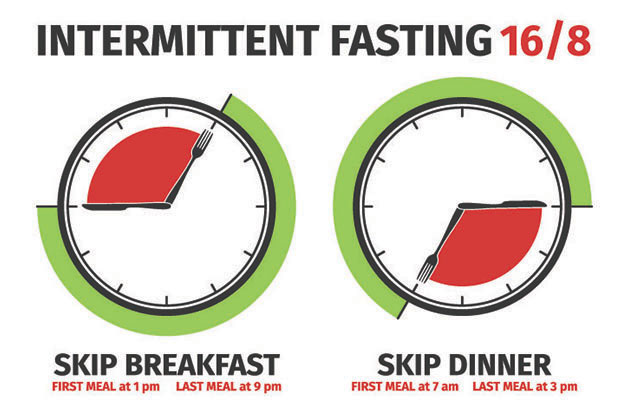Study shows that intermittent fasting for certain intervals can promote good health by boosting our metabolism
Fasting is a natural phenomenon in most animals and to accommodate fasting in dire circumstances, metabolic changes occur in their body. Fasting allows the body to burn excess fat inside. So, it’s considered a very normal and natural process which doesn’t have any detrimental effects on our body system as during fasting ‘body fat’ – food energy stored in the body – is consumed. Intermittent fasting involves eating during a specific timeframe and then fasting for certain extended periods of time. Intermittent fasting is a diet which has become popular as it is thought to have immense weight loss benefits and it is now labelled as a lifestyle choice. Though it is strongly believed that intermittent fasting is beneficial, there is less clarity on the exact nature of these benefits.
When we eat food, food is ingested and then some of it is stored for energy which can be used later. The hormone insulin is primarily responsible for this process. The excess energy is stored in the liver as sugars called glycogens, here the storage capacity is very limited. Once this limit times out, our liver starts to convert excess sugars into fat. All of this excess fat cannot be stored in the liver because of storage limitation; hence it is exported to other parts of the body where the storage is unlimited. This excessive storage of fat then becomes the reason for weight gain and other diseases.
Effect of fasting on our circadian clock
Researchers from University of California Irvine, USA have investigated the impact of fasting on our body and more specifically on our circadian clock. Circadian rhythms are our daily sleep-wake cycles which are integral to life and maintain our body’s equilibrium. This 24-hour cycle not just controls our sleep and wake pattern but also involves metabolic, physiological and behavioral changes which affect every living tissue in our body. For example, when we are deprived of glucose, liver starts creating ketones from fatty acids so that body could use that as an emergency energy source.
The food which we consume has a major effect on our circadian clock as eating modulates circadian rhythms, what is still not understood is how exactly does ‘fasting’ impact these rhythms and in turn affect our health. Researchers set out to understand how fasting can influence circadian rhythms in liver and skeletal muscles in mice in their study published in Cell Reports. The animals were on a 24-hour fasting period, when their physiological functions were measured. When mice were fasting, they used less oxygen and energy. But as soon as they started eating again, this physiological change is reversed. Fasting caused fasting-sensitive cellular responses in mice which led to reorganization of genes in skeletal muscle and liver, causing their metabolism to speed up and this promoted good health. Different muscles showed varied response, example skeletal muscles were twice responsive to fasting compared to liver muscles. These gene changes were clear ‘during’ fasting. Thus, fasting influences the circadian clock as the animal’s circadian oscillations were more robust in fasting mice. Also, when compared, despite consuming same amount of energy, fasting mice did not develop obesity or metabolic disorders as the other mice.
Exercise, protein-rich diet and intermittent fasting
The findings suggest that fasting basically reprograms different cellular responses. And if timing of fasting could be planned in an efficient manner, there could be a positive effect on cellular functions and this could provide health benefits and protection against ageing-related diseases. It is clear that fasting is enabling new rhythmic gene expression (by regulation) and could drive changes in our metabolism via our circadian clocks. This can have an overall positive impact on our health. It’s well established that disruption in circadian rhythms can increase risk of obesity and also metabolic disorders like diabetes, which is further validated by the current study on fasting. Findings define only the first step in understanding how fasting influences our circadian rhythms, but it’s in the direction of how to find the most optimal fasting regime/guidelines which can have metabolism-boosting effects and can promote good health. Along with exercise and protein-rich diet, intermittent fasting (staring with a 12-hour interval) can be a good lifestyle addition.
***
Source(s)
Kinouchi K et al. 2018. Fasting Imparts a Switch to Alternative Daily Pathways in Liver and Muscle. Cell Reports. 25(12). https://doi.org/10.1016/j.celrep.2018.11.077






































